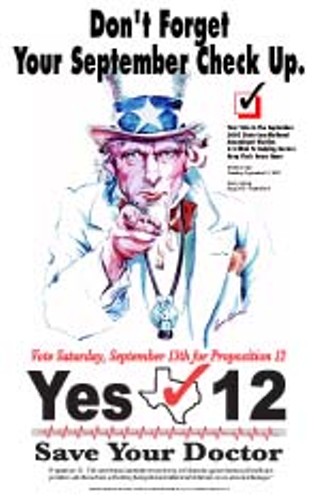Naked City
The Proposition 12 Propaganda
By Michael King, Fri., Sept. 12, 2003

Saturday, Sept. 13, is the Texas constitutional election, and today's Capitol rumor is that if Proposition 12 wins, Gov. Rick Perry is thinking of declaring a new state holiday. Perry has been touring state hospitals and HMOs promoting Proposition 12 as though his campaign account depends upon it, as has first lady Anita Perry. However, the guv has stayed out of South Texas -- reportedly because his popularity there is so low proponents are worried he'll hurt their cause.
Proposition 12 would make constitutional the Lege's already-enacted $250,000 cap on noneconomic damages in medical-malpractice lawsuits and empower the Legislature to place similar caps in "other actions" -- the bland euphemism used by the drafters to allow limits on all civil lawsuits. As Chronicle readers can tell from the prime-time TV commercials, both sides are pouring money into the campaign, with plaintiffs' law firms carrying much of the load for opponents, and doctors, health care institutions, and insurance firms underwriting the supporters. The Texas Medical Association says on its Web site that if every Texas physician convinces 20 people (including patients) to vote for Proposition 12, the amendment is guaranteed victory.
Texans for Public Justice went to the trouble of calculating how much pro-Proposition 12 industry groups had spent on public officials before the amendment campaigns ever started, and the numbers are impressive. "PACs and businesses that support Proposition 12 contributed a total of $5,315,767 to Gov. Rick Perry, Lt. Gov. David Dewhurst, and current members of the Legislature during the 2002 election cycle," TPJ reports, and lawmakers who supported Proposition 12 (then HJR 3) received four times as much money as those who opposed it. Trial-lawyer PACs contributed less than one-tenth that amount to politicos during the same period. For the full report, see www.tpj.org.
The Big Lie disseminated by Proposition 12 supporters is that the malpractice "crisis" has already decimated Texas medicine and that failure to pass the amendment will lead doctors to leave the profession and Texas in droves (flocks? swarms? herds?). But San Antonio Express-News columnist Carlos Guerra, with the help of Houston reader Chris Junker, took a look at statistics from the State Board of Medical Examiners and discovered, "31,071 medical and osteopathic doctors were practicing in Texas in May 1997 and 33,999 in May 2000. By May 2003, there were 38,035." Guerra found similar rates of increase in Hidalgo and Cameron counties -- the Valley communities supposedly at ground zero of the "crisis" have seen a 16% increase in their population of doctors since 2000. Even the TMA's own Web site projects a "negligible surplus" of doctors in Texas by 2005. Junker, who says he was moved to investigate after seeing doctors' ads, comments succinctly, "Liar, liar, pants on fire."
Such ads can be found at Austin Regional Clinic, among the larger practices in town; patients complain to Naked City that the ARC's offices are filled with Proposition 12 propaganda. Reader Larry Froelich says that when he visited his daughter's doctor this week for a checkup, "[I] told the doctor that I objected to the politicization of the medical relationship and that I was considering taking my family elsewhere. He told me, 'That's your decision.'"
The ARC's Dr. Howard Marcus said that in 20 years, the clinic has never taken a position on any political issue or candidate, but that "Proposition 12 is extremely important to the liability situation of doctors, and is central to the interests of our patients." Marcus is also chairman of the board of the Texas Medical Liability Trust, the largest carrier of medical-malpractice insurance in the state, insuring 10,700 doctors. He says the trust has agreed to drop its premiums by 12% beginning Jan. 1 -- provided Proposition 12 passes.
He defended the use of the clinic, saying, "I'm a U.S. citizen with a right to free speech, especially in my own private office," and he said the doctors have been very careful not to abuse that right. "We've had many patients that are pleased that we're doing this," Marcus said. He also argued that there is no conflict of interest between his role as a doctor and as chair of the nonprofit Liability Trust. "The trust is owned entirely by physicians, and its sole purpose is to provide liability coverage for doctors. It's endorsed by the Texas Medical Association, and it acts in the best interest of doctors."
Got something to say on the subject? Send a letter to the editor.








